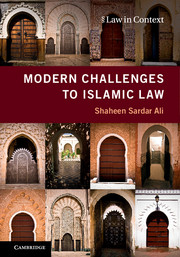Book contents
- Frontmatter
- Dedication
- Contents
- Acknowledgements
- Glossary
- Table of Cases
- Table of Legislation
- Introduction
- 1 Sharia: The Flowing Stream
- 2 An Elephant in the Room or a Needle in a Haystack? Searching for ‘Islamic’ Constitutionalism(s)
- 3 Contextualizing Family Law Reform and Plural Legalities in Post-colonial Pakistan
- 4 In Search of Legitimacy: The Dilemma of Islamic Finance
- 5 Muslim Women's Contributions to Drafting CEDAW: An Untold Narrative
- 6 CEDAW? What's That? ‘Domesticating’ ‘International’ Women's Human Rights in Muslim Jurisdictions: Reflections on Pakistan's Engagement with CEDAW
- 7 ‘Between the Devil and the Deep Blue Sea’: Sharia Councils and Muslim Women's Rights in the British Muslim Diaspora
- 8 Internet Fatawa: Challenging Tradition and Modernity in Women and Gender Issues
- Conclusion
- Bibliography
- Index
3 - Contextualizing Family Law Reform and Plural Legalities in Post-colonial Pakistan
Published online by Cambridge University Press: 05 September 2016
- Frontmatter
- Dedication
- Contents
- Acknowledgements
- Glossary
- Table of Cases
- Table of Legislation
- Introduction
- 1 Sharia: The Flowing Stream
- 2 An Elephant in the Room or a Needle in a Haystack? Searching for ‘Islamic’ Constitutionalism(s)
- 3 Contextualizing Family Law Reform and Plural Legalities in Post-colonial Pakistan
- 4 In Search of Legitimacy: The Dilemma of Islamic Finance
- 5 Muslim Women's Contributions to Drafting CEDAW: An Untold Narrative
- 6 CEDAW? What's That? ‘Domesticating’ ‘International’ Women's Human Rights in Muslim Jurisdictions: Reflections on Pakistan's Engagement with CEDAW
- 7 ‘Between the Devil and the Deep Blue Sea’: Sharia Councils and Muslim Women's Rights in the British Muslim Diaspora
- 8 Internet Fatawa: Challenging Tradition and Modernity in Women and Gender Issues
- Conclusion
- Bibliography
- Index
Summary
Introduction
Family law reforms in the Muslim world represent a fascinating yet challenging example of the ongoing contestations between contemporary notions of justice, equality and human rights on the one hand and established understandings of Islamic jurisprudence (fiqh) on the other. They also represent a critical shift in Muslim thinking globally, in that family law is now being discussed as a multi-layered and complex subject straddling religion, politics, economics, gender equality and women's rights. New interlocutors in this discussion include Muslim women; NGOs; print and electronic media; national, regional and international human rights bodies; and national parliaments.
Historically, family law reform projects in the Muslim world, including Pakistan, have been conceptualized within a framework of patriarchal norms and an understanding of a contractual nature of marriage and divorce supported by religious texts (mainly the Qur'an and the Sunna, or teachings and practices of the Prophet). Though religious texts ensured women a legal status and distinct (if not equal) rights in all spheres of life, Muslim women have continually confronted ‘a moral and anthropological context that privileged male authority and the male voice’. Family law reform in the Muslim world, often referred to as ‘woman-friendly reform’, is an attempt at ‘neutralizing’ some of the unfettered male power within the institutions of marriage and divorce without displacing or challenging what are perceived as immutable religious texts. Simultaneously, however, where ‘Islamist’ parties or individuals have come into power (for instance Nimeiri in Sudan, Imam Khomeini in Iran, and Zia-ul-Haq in Pakistan), they have engaged in law reform based on different readings of those same texts, leading to changes in the law adversely affecting women in these jurisdictions.
The general premise underlying Islamic family law is that society consists of male-headed households where men hold authority and provide and protect vulnerable, weak and dependent females in their charge. In other words, family law reform implicitly assumes the supremacy of a wilaya–qiwama (‘guardian–provider’) nexus; that is, the connection between men's authority over women and their obligation to protect and maintain them. The main dynamic of law reform is the challenge mounted to this nexus by some societal constituencies.
- Type
- Chapter
- Information
- Modern Challenges to Islamic Law , pp. 79 - 112Publisher: Cambridge University PressPrint publication year: 2016



